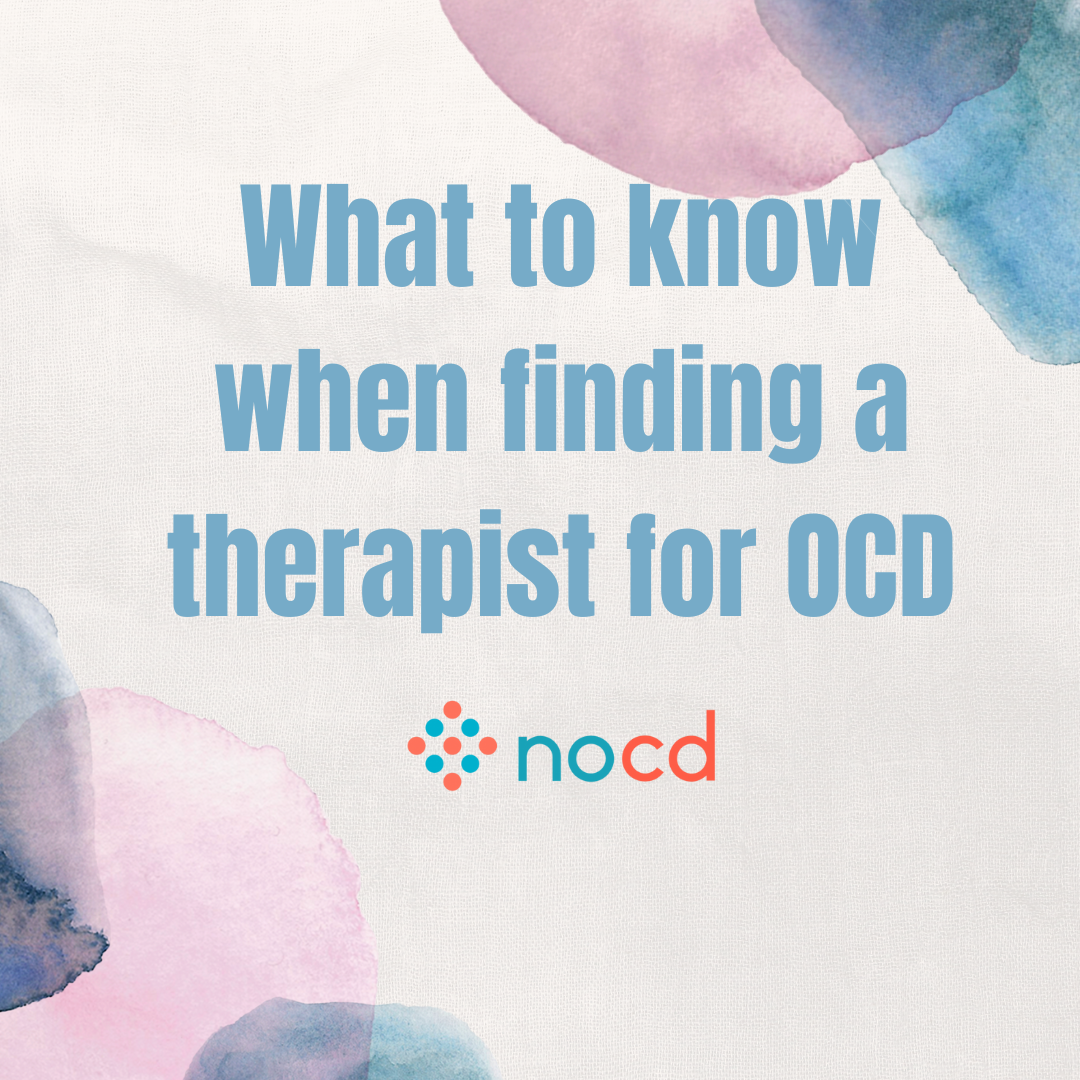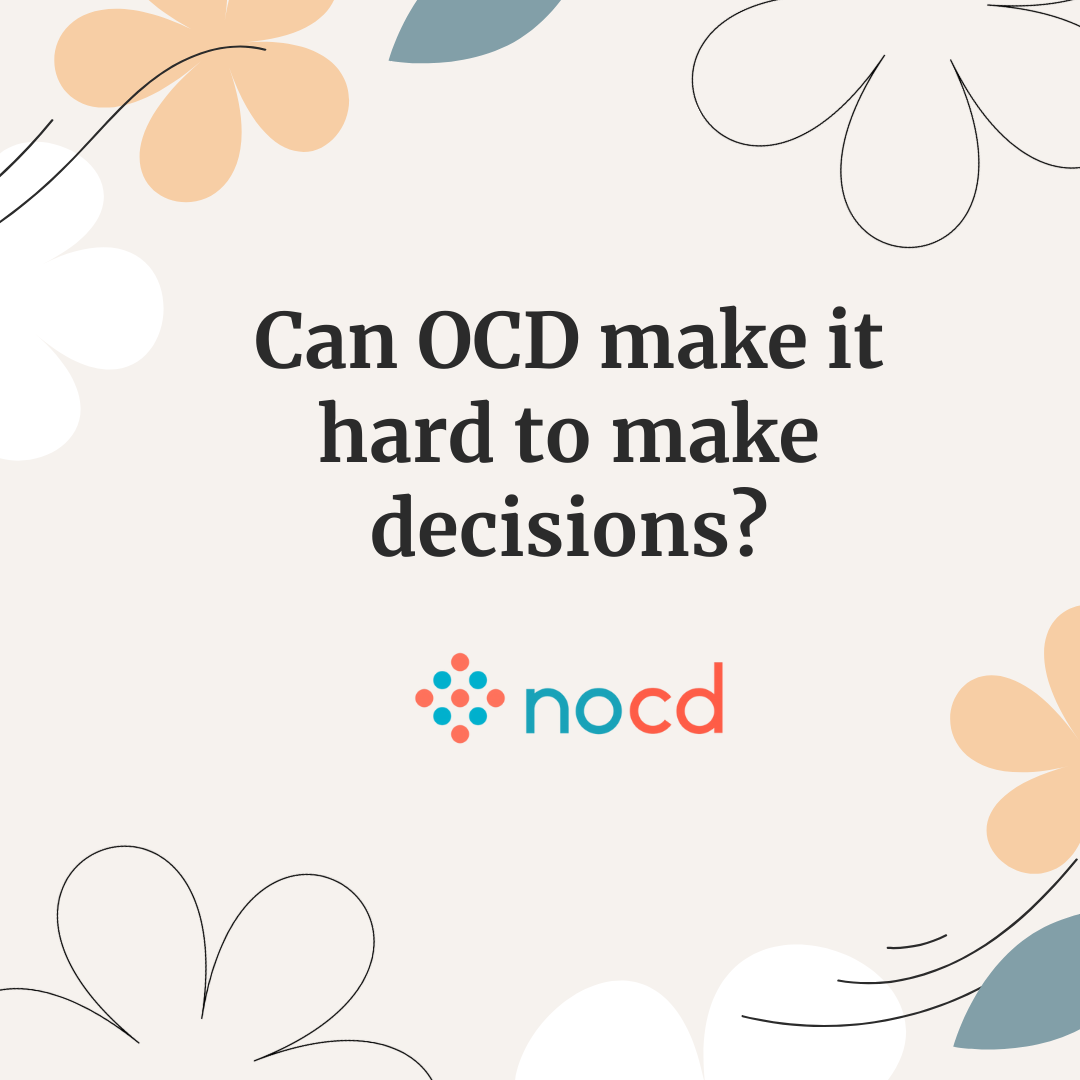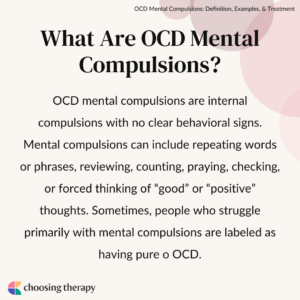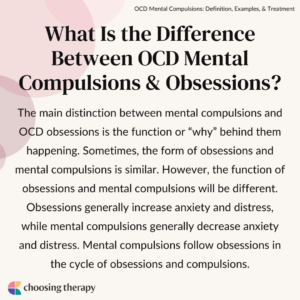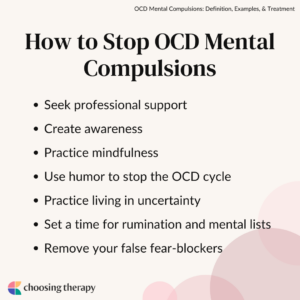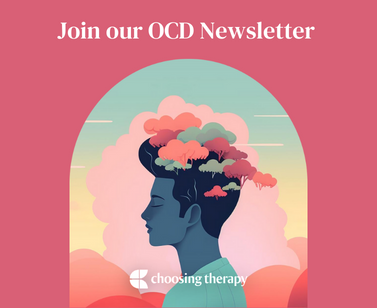OCD mental compulsions are internal mental rituals that, in the short term, decrease distress caused by obsessions. Research shows that individuals with OCD who have mental compulsions have a more severe form of OCD.1 They also experience symptoms for longer lengths of time than those with primarily physical compulsions.1 OCD mental compulsions are treated with cognitive or exposure therapies and medication.1,2
What is the best therapy for OCD? Exposure And Response Prevention Therapy (ERP) – Do live video sessions with a therapist specialized in ERP, the gold standard treatment for OCD. Treatment from NOCD is covered by many insurance plans. Start With A Free 15 Minute Call
What Are OCD Mental Compulsions?
Obsessive-compulsive disorder (OCD) mental compulsions are internal compulsions with no clear behavioral signs. Mental compulsions can include repeating words or phrases, reviewing, counting, praying, checking, or forced thinking of “good” or “positive” thoughts. Sometimes, people who struggle primarily with mental compulsions are labeled as having pure o OCD.
OCD mental compulsions have a significant impact on people because they are hard to identify, occur frequently, and quickly escalate. Sometimes, the person with OCD does not recognize their mental compulsions as compulsions. Treatment may be the first time someone helps them identify their OCD mental compulsions as separate from other internal thoughts.
Mental Compulsions Vs. Physical Compulsions
Mental compulsions are mental rituals done to neutralize distress caused by obsessions. Physical compulsions are clear behavioral acts a person with OCD performs to neutralize distress caused by obsessions. Sometimes, a person has mainly mental or mainly physical compulsions, but it is also possible to have a mix. Mental compulsions are often harder to diagnose and sometimes minimized, as they are less noticeable to others.
Examples of physical compulsions include:
- Obsessively seeking reassurance from others
- Confessing perceived faults to others
- Researching
- Cleaning or washing
- Checking
- Arranging or ordering
- Physical avoidance of triggers
Examples of mental compulsions include:
- Self-reassurance
- Mental list-making
- Mental checking
- Comparing thoughts, events, or situations
- Praying
- Repeating words or phrases
- Counting
- Mental reviewing of events, conversations, or thoughts
- Wishing or “should” statements
- Thought replacing
- Rumination
OCD is often associated with physical compulsions like cleaning, organizing, or arranging. However, mental compulsions are equally distressing and significant behaviors. They just aren’t as easy to see as physical compulsions, which sometimes means they are missed or minimized by the person experiencing them, loved ones, and providers.
What Is the Difference Between OCD Mental Compulsions & Obsessions?
The main distinction between mental compulsions and OCD obsessions is the function or “why” behind them happening. Sometimes, the form of obsessions and mental compulsions is similar. However, the function of obsessions and mental compulsions will be different. Obsessions generally increase anxiety and distress, while mental compulsions generally decrease anxiety and distress. Mental compulsions follow obsessions in the cycle of obsessions and compulsions.
For example, someone with harm OCD may have a recurrent obsession with harming loved ones. This causes them distress, so they may mentally review events that “prove” they would not harm their loved one. Without in-depth questioning, an outside observer might confuse the obsession with the mental compulsion. However, mental review provides self-reassurance that decreases anxiety, while the intrusive obsession of harming a loved one increases anxiety.
Types of OCD Mental Compulsions
Common mental compulsions include self or other reassurance, mental review, thought replacing, and rumination.1,2 Certain types of obsessions and mental compulsions commonly occur together. For example, OCD intrusive sexual thoughts often pair with mental rituals, while symmetry obsessions generally pair with counting.3 Harm obsessions generally prompt mental review, self-reassurance, or reassurance from others.3
Common types of OCD mental compulsions include:
- Individuals with harm OCD may mentally review events to prevent harm
- Individuals with scrupulosity OCD may engage in excessive prayer
- Individuals with pure O OCD may engage in mental rituals or thought-neutralizing
- Individuals with contamination OCD may engage in self-reassurance or mental un-doing
- Individuals with relationship OCD may engage in mental review or list-making
- Individuals with somatic OCD may engage in body scanning, checking, or excessive awareness
- Individuals with real event OCD may engage in excessive rumination
- Individuals with existential OCD may engage in mental reviewing of thoughts, conversations, spiritual texts, or research
Impact of Mental Compulsions
OCD mental compulsions significantly impact daily life. Although they are not visible, mental compulsions can take up similar amounts of time and energy as physical compulsions. Additionally, having OCD mental compulsions is associated with earlier symptom onset, more severe symptoms, and longer-lasting symptoms.1 Since OCD mental compulsions are also associated with excessive reassurance-seeking, relationships can be negatively impacted as well.1
How to Stop OCD Mental Compulsions
Although you might not be able to stop OCD mental compulsions completely, there are ways to manage them through coping skills for OCD. Professionals can support you by guiding your OCD exposures. Mindfulness and awareness strategies can help you identify people, places, and situations that trigger OCD mental compulsions. Exposure-based interventions can help you pause to recognize and prevent OCD mental compulsions.
Treatment For OCD NOCD: Online OCD Treatment Covered By Insurance – Regain your life from OCD. Do live video sessions with a licensed therapist specialized in treating OCD. Treatment from NOCD is covered by most major insurance plans. Learn how you can use your insurance benefits. Visit NOCD Talkiatry: Is OCD Medication Right For You? Speak with A Doctor – Talkiatry can match you with a psychiatrist who takes your insurance and is accepting new patients. They’re in-network with major insurers and offer medication management with supportive therapy. Free Assessment
Here are seven ways to stop OCD mental compulsions:
1. Seek Professional Support
If OCD mental compulsions are taking up large amounts of time and energy and preventing you from fulfilling work or school obligations, it can be helpful to seek out therapy or medication management. Professional support might look like finding a therapist, prescribing provider, or group led by a professional who specializes in OCD.
An online therapist directory or online therapy platform can help find a therapist who specializes in treating OCD mental compulsions and rituals. Online psychiatrist options can assist in finding a prescribing provider to assess and give medications that might provide biological relief from OCD mental compulsions.
2. Create Awareness
Creating awareness around OCD mental compulsions is the first step in beginning to manage them. People often struggle to identify OCD mental compulsions because they are intrusive and progress quickly. They are also hard to identify from other internal thoughts. Sometimes, people spend long amounts of time in a mental ritual without recognizing they are “stuck” in one.
Learning to recognize people, places, and situations that trigger OCD mental compulsions can help create awareness about when they might occur. Even if you get “stuck” in a compulsion that has already started, learning to identify you are “stuck” and pull yourself out of the compulsion is also a helpful strategy. Experts sometimes call this “spoiling” a ritual on purpose for the benefit of engaging in an exposure.4
Here are some ways to become aware that you are engaging in a mental compulsion:
- You are irritated if someone or something interrupts your ritual
- You are spending a large amount of time caught in the same thought loop
- You feel an intense pull or urge to keep thinking about the same thing
- Learn the different types of mental compulsions and identify your types
3. Practice Mindfulness
Mindfulness strategies focus on gentle and nonjudgmental awareness of thoughts, feelings, and sensations.5 Studies support mindfulness-based interventions as an effective treatment for OCD mental compulsions.5 Mindfulness strategies are particularly helpful for OCD mental compulsions because they treat underlying avoidance, issues with attention, and struggles with impulsively going from thought to action.5
Mindfulness strategies might include focusing on sensory experiences, sitting or walking meditations, or mindful breathing. Sometimes, practicing acceptance of emotional experiences can be helpful when using a mindful mantra, such as, “I allow my thoughts to pass like clouds in the sky.”
4. Use Humor to Stop the OCD Cycle
Humor is a helpful component in battling OCD mental compulsions because it breaks the thought-fusion cycle. You can think of the normal OCD cycle as experiencing an obsession, which triggers distress, and then comes the mental compulsion. Humor can be inserted in between the distress and the compulsion. The idea is to use humor to exaggerate the feared obsession to a ridiculous or comical proportion.
For example, let’s say someone is struggling with hit-and-run OCD. They might feel the urge to mentally review their drive down the street or ruminate on whether or not they should “check” the news later to check reported accidents. They might say to OCD, “You’re right, OCD, I probably hit someone. At least they’ll put me in jail, and I won’t have to go to work tomorrow!”
5. Practice Living in Uncertainty
OCD mental compulsions thrive on your uncertainty and doubt. Ask yourself, “In what situations am I willing to practice sitting with doubt?” Think of people, places, and situations that trigger your OCD mental compulsions. If you can build your confidence sitting through the distress of situations that trigger doubt on smaller scales, you may be more likely to feel strong enough to attack the bigger themes of your uncertainty.
6. Set a Time for Rumination & Mental Lists
Rumination often feels out of control for a person with OCD mental compulsions. It feels like something that happens to you rather than something you choose to happen. Rumination is actually an OCD mental compulsion, sometimes in the form of a mental ritual. Setting a time of day for engaging in mental rituals forces you to recognize that rumination is a choice.
When the time comes, allow yourself to engage in the ritual for a set period of time. Then, when the timer goes off, practice sitting in distress without engaging in OCD mental compulsions. You likely will feel a strong urge to ‘do’ something or continue your mental lists and rituals. Preventing yourself from completing the ritual is, in fact, exposing you to the distress-causing OCD mental compulsions.
7. Remove Your False Fear-Blockers
False fear-blockers are any compulsions that provide a false sense of safety after experiencing an obsession.6 These false fear-blockers prevent recovery by getting in the way of exposure work. Common fear-blockers include avoidance, distraction, and reassurance-seeking behaviors.6 For people with OCD mental compulsions, this might look like self-reassurance that everything will be okay, distracting from mental chatter by thought replacing, or avoiding obsessional thoughts by neutralizing with “good” mental images.
Treatment for OCD Mental Compulsions
The treatment approaches for OCD mental compulsions are generally the same as those for people with physical compulsions. Typical treatment consists of medication, therapy, or a combination approach. Some people also find relief in joining OCD groups, where a professional can offer psychoeducation, and the group can offer support and relationships.
What is the best therapy for OCD? Exposure And Response Prevention Therapy (ERP) – Do live video sessions with a therapist specialized in ERP, the gold standard treatment for OCD. Treatment from NOCD is covered by many insurance plans. Start With A Free 15 Minute Call
Experts have the most evidence for exposure and cognitive therapies, such as ERP or CBT, for OCD mental compulsion treatment.3,4 Some experts have also found evidence that mindfulness-based interventions can be added to cognitive or exposure therapies for additional symptom relief.5
Effective therapy options for OCD include:
- Exposure and response prevention (ERP): ERP helps someone with OCD mental compulsions learn how to expose themselves to the content of obsessions, while preventing mental compulsions and rituals. Through therapy, they learn how to sit in the distress of obsessions through exposures, without ‘doing’ anything to prevent the distress. Over time, distress becomes easier to sit through, which prevents the OCD cycle from happening.
- Cognitive behavioral therapy (CBT): CBT for OCD helps someone with OCD understand the relationship between thoughts, emotions, and behaviors. Through CBT, someone might learn strategies to challenge or reframe obsessive thoughts.
- Mindfulness-based cognitive therapy (MBCT): MBCT combines cognitive approaches with mindfulness principles to help someone become more accepting of difficult thoughts and emotions. Through MBCT, someone might develop a more nonjudgmental and accepting relationship with OCD obsessions, which helps them reduce engaging in OCD mental compulsions.
- Acceptance and commitment therapy (ACT): ACT for OCD is focused on building a person’s ability for mental flexibility. Through ACT, someone learns how to live and commit to their core values and experiences OCD thoughts as more neutral and less provoking of OCD mental compulsions.
- Medication: Typical medications for managing OCD include antidepressants and, in rare cases, antipsychotics or benzodiazepines. The first choice of antidepressants is usually SSRIs, but sometimes SNRIs or tricyclics may be used if SSRIs are not working. Antidepressants are usually given in larger doses than what might be used to treat depressive disorders.9
Tailored treatment plans are important for OCD mental compulsions. Keeping consistent appointments with your therapist and prescribing provider can help adapt treatment as it continues. It is important to report any obstacles to treatment or side effects to your providers so that they can change medication and therapy to support your needs.
How to Find Professional Support
If OCD mental compulsions are happening daily, it is important to seek treatment. Especially if the mental compulsions are taking up a lot of your time and energy or negatively impacting life goals and relationships, you can find a therapist through an online therapist directory or online therapy platform who can help you find strategies to combat your OCD mental compulsions.
Sometimes, OCD treatment is easier to approach when you have some biological relief from medication. You can find a prescribing provider through online psychiatrist options to get a psychological assessment and find out if medication management might be helpful for your OCD treatment.
In My Experience
To help our readers take the next step in their mental health journey, Choosing Therapy has partnered with leaders in mental health and wellness. Choosing Therapy is compensated for marketing by the companies included below. OCD Therapy NOCD: Effective, Affordable, & Convenient OCD Therapy Do live, face-to-face video sessions with a therapist who specializes in treating OCD and get 24/7 support between sessions. NOCD is covered by many insurance plans and is available nationwide. Visit NOCD Treatment From An Online Psychiatrist Talkiatry OCD is treatable. Talkiatry specializes in OCD and provides personalized care with medication and additional support. Get started with a short assessment. OCD Community - Free To Join! Join others who are overcoming OCD. Participate anonymously. Find support, connect, and overcome challenges with us. The community is managed by NOCD. Join The Community OCD Newsletter A free newsletter from Choosing Therapy for those impacted by OCD. Get helpful tips and the latest information. Sign-UpAdditional Resources
What to know when finding a therapist for OCD With so much information out there regarding providers and treatment options for obsessive compulsive disorder, it can be hard to know exactly where to start—especially when you have to consider everything from the type of provider to the different treatment methods, as well as how you’ll fit it into your busy schedule. Can OCD make it hard to make decisions? From choosing what to wear in the morning to picking what to eat for dinner, decision-making is a part of everyone’s daily routine. But for millions of people with Obsessive-Compulsive Disorder (OCD), making any choice can feel like a daunting, sometimes impossible task.